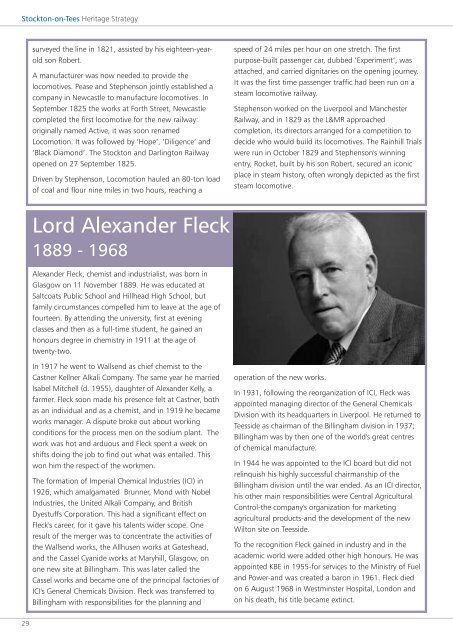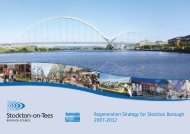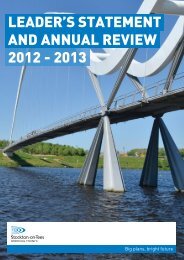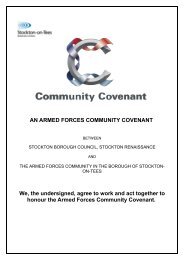Heritage Strategy - Stockton-on-Tees Borough Council
Heritage Strategy - Stockton-on-Tees Borough Council
Heritage Strategy - Stockton-on-Tees Borough Council
You also want an ePaper? Increase the reach of your titles
YUMPU automatically turns print PDFs into web optimized ePapers that Google loves.
stockt<strong>on</strong>-<strong>on</strong>-<strong>Tees</strong> <str<strong>on</strong>g>Heritage</str<strong>on</strong>g> <str<strong>on</strong>g>Strategy</str<strong>on</strong>g><br />
surveyed the line in 1821, assisted by his eighteen-yearold<br />
s<strong>on</strong> Robert.<br />
A manufacturer was now needed to provide the<br />
locomotives. Pease and Stephens<strong>on</strong> jointly established a<br />
company in Newcastle to manufacture locomotives. In<br />
September 1825 the works at Forth Street, Newcastle<br />
completed the first locomotive for the new railway:<br />
originally named Active, it was so<strong>on</strong> renamed<br />
Locomoti<strong>on</strong>. It was followed by ‘Hope’, ‘Diligence’ and<br />
‘Black Diam<strong>on</strong>d’. The <str<strong>on</strong>g>Stockt<strong>on</strong></str<strong>on</strong>g> and Darlingt<strong>on</strong> Railway<br />
opened <strong>on</strong> 27 September 1825.<br />
Driven by Stephens<strong>on</strong>, Locomoti<strong>on</strong> hauled an 80-t<strong>on</strong> load<br />
of coal and flour nine miles in two hours, reaching a<br />
speed of 24 miles per hour <strong>on</strong> <strong>on</strong>e stretch. The first<br />
purpose-built passenger car, dubbed ‘Experiment’, was<br />
attached, and carried dignitaries <strong>on</strong> the opening journey.<br />
It was the first time passenger traffic had been run <strong>on</strong> a<br />
steam locomotive railway.<br />
Stephens<strong>on</strong> worked <strong>on</strong> the Liverpool and Manchester<br />
Railway, and in 1829 as the L&MR approached<br />
completi<strong>on</strong>, its directors arranged for a competiti<strong>on</strong> to<br />
decide who would build its locomotives. The Rainhill Trials<br />
were run in October 1829 and Stephens<strong>on</strong>'s winning<br />
entry, Rocket, built by his s<strong>on</strong> Robert, secured an ic<strong>on</strong>ic<br />
place in steam history, often wr<strong>on</strong>gly depicted as the first<br />
steam locomotive.<br />
Lord alexander Fleck<br />
1889 - 1968<br />
Alexander Fleck, chemist and industrialist, was born in<br />
Glasgow <strong>on</strong> 11 November 1889. He was educated at<br />
Saltcoats Public School and Hillhead High School, but<br />
family circumstances compelled him to leave at the age of<br />
fourteen. By attending the university, first at evening<br />
classes and then as a full-time student, he gained an<br />
h<strong>on</strong>ours degree in chemistry in 1911 at the age of<br />
twenty-two.<br />
In 1917 he went to Wallsend as chief chemist to the<br />
Castner Kellner Alkali Company. The same year he married<br />
Isabel Mitchell (d. 1955), daughter of Alexander Kelly, a<br />
farmer. Fleck so<strong>on</strong> made his presence felt at Castner, both<br />
as an individual and as a chemist, and in 1919 he became<br />
works manager. A dispute broke out about working<br />
c<strong>on</strong>diti<strong>on</strong>s for the process men <strong>on</strong> the sodium plant. The<br />
work was hot and arduous and Fleck spent a week <strong>on</strong><br />
shifts doing the job to find out what was entailed. This<br />
w<strong>on</strong> him the respect of the workmen.<br />
The formati<strong>on</strong> of Imperial Chemical Industries (ICI) in<br />
1926, which amalgamated Brunner, M<strong>on</strong>d with Nobel<br />
Industries, the United Alkali Company, and British<br />
Dyestuffs Corporati<strong>on</strong>. This had a significant effect <strong>on</strong><br />
Fleck's career, for it gave his talents wider scope. One<br />
result of the merger was to c<strong>on</strong>centrate the activities of<br />
the Wallsend works, the Allhusen works at Gateshead,<br />
and the Cassel Cyanide works at Maryhill, Glasgow, <strong>on</strong><br />
<strong>on</strong>e new site at Billingham. This was later called the<br />
Cassel works and became <strong>on</strong>e of the principal factories of<br />
ICI's General Chemicals Divisi<strong>on</strong>. Fleck was transferred to<br />
Billingham with resp<strong>on</strong>sibilities for the planning and<br />
operati<strong>on</strong> of the new works.<br />
In 1931, following the reorganizati<strong>on</strong> of ICI, Fleck was<br />
appointed managing director of the General Chemicals<br />
Divisi<strong>on</strong> with its headquarters in Liverpool. He returned to<br />
<strong>Tees</strong>side as chairman of the Billingham divisi<strong>on</strong> in 1937;<br />
Billingham was by then <strong>on</strong>e of the world's great centres<br />
of chemical manufacture.<br />
In 1944 he was appointed to the ICI board but did not<br />
relinquish his highly successful chairmanship of the<br />
Billingham divisi<strong>on</strong> until the war ended. As an ICI director,<br />
his other main resp<strong>on</strong>sibilities were Central Agricultural<br />
C<strong>on</strong>trol-the company's organizati<strong>on</strong> for marketing<br />
agricultural products-and the development of the new<br />
Wilt<strong>on</strong> site <strong>on</strong> <strong>Tees</strong>side.<br />
To the recogniti<strong>on</strong> Fleck gained in industry and in the<br />
academic world were added other high h<strong>on</strong>ours. He was<br />
appointed KBE in 1955-for services to the Ministry of Fuel<br />
and Power-and was created a bar<strong>on</strong> in 1961. Fleck died<br />
<strong>on</strong> 6 August 1968 in Westminster Hospital, L<strong>on</strong>d<strong>on</strong> and<br />
<strong>on</strong> his death, his title became extinct.<br />
29

















